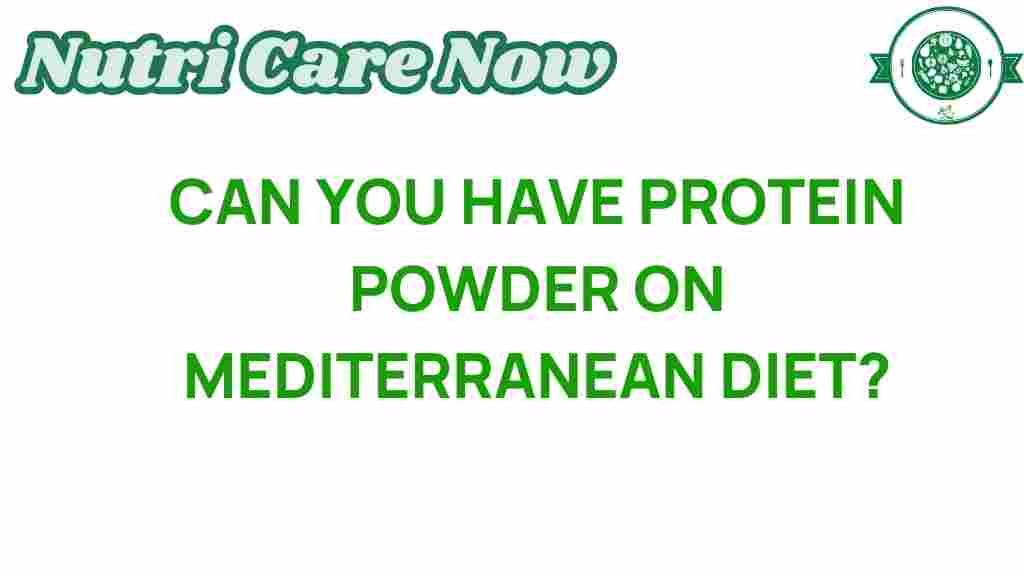The Surprising Role of Protein Powder in the Mediterranean Diet
The Mediterranean diet is renowned for its health benefits, emphasizing whole foods, healthy fats, and a variety of nutrient-rich ingredients. However, as more people seek to optimize their nutrition for fitness and wellness, the use of dietary supplements, particularly protein powder, has gained attention. This article explores how protein powder can complement the Mediterranean diet, enhance its health benefits, and serve as a practical protein source for those pursuing a balanced diet.
Understanding the Mediterranean Diet
The Mediterranean diet is based on the traditional eating habits of countries bordering the Mediterranean Sea. This diet is rich in:
- Fruits and vegetables
- Whole grains
- Legumes
- Nuts and seeds
- Healthy fats, particularly olive oil
- Moderate consumption of fish and poultry
- Limited intake of red meat and processed foods
- Low-fat dairy products
Research has consistently linked this diet to numerous health benefits, including reduced risk of heart disease, improved metabolic health, and enhanced longevity. However, as lifestyles change and physical activity levels increase, the need for adequate protein intake becomes crucial.
The Importance of Protein in the Mediterranean Diet
Protein plays a vital role in maintaining muscle mass, supporting recovery after exercise, and promoting overall health. While the Mediterranean diet includes several excellent protein sources, such as fish, legumes, and dairy, some individuals may find it challenging to meet their protein needs solely through whole foods.
This is where protein powder can be an effective dietary supplement. By incorporating protein powder into the Mediterranean diet, individuals can enhance their protein intake without compromising the diet’s fundamental principles.
Types of Protein Powder
There are various types of protein powder available, each with unique benefits. Here are some common types:
- Whey Protein: Derived from milk, whey protein is a complete protein that is quickly absorbed by the body. It’s ideal for post-workout recovery.
- Casein Protein: Also from milk, casein is absorbed more slowly, making it suitable for sustained protein release, such as before bedtime.
- Plant-Based Protein: Options like pea protein, brown rice protein, and hemp protein cater to vegetarians and vegans. They provide essential amino acids and are often easier to digest.
- Egg Protein: A high-quality protein source that contains all essential amino acids, egg protein is a great alternative for those who are lactose intolerant.
Incorporating Protein Powder into the Mediterranean Diet
Integrating protein powder into a Mediterranean diet can be simple and enjoyable. Here are some delicious and nutritious ways to do so:
1. Smoothies
Add a scoop of protein powder to your morning smoothie, combining it with:
- Leafy greens (spinach or kale)
- Fruits (bananas, berries, or apples)
- Greek yogurt or almond milk
2. Protein-Packed Pancakes
Mix protein powder into your pancake batter using whole wheat flour, eggs, and Greek yogurt for a nutritious breakfast or snack.
3. Soups and Stews
Stir protein powder into soups or stews for added nutrition. It works well with lentil soup or minestrone, enhancing the protein content without altering the flavor significantly.
4. Baked Goods
Incorporate protein powder into your baking. Try adding it to muffins, bread, or energy bars for a healthy treat that supports your fitness goals.
5. Salad Dressings
Blend protein powder into homemade salad dressings to boost the nutrition of your salads. Mix it with olive oil, vinegar, and herbs for a delicious addition.
Health Benefits of Combining Protein Powder with the Mediterranean Diet
By integrating protein powder into the Mediterranean diet, individuals can experience various health benefits, including:
- Enhanced Muscle Recovery: Protein powder aids in muscle repair post-exercise, improving overall fitness and physical performance.
- Weight Management: Increased protein intake can promote satiety, helping to manage hunger and support weight loss or maintenance.
- Convenience: Protein powder offers an easy, quick way to increase protein intake, especially for those with busy lifestyles.
- Improved Nutritional Balance: When combined with nutrient-dense Mediterranean foods, protein powder can help create a balanced diet that meets all dietary needs.
Potential Challenges and Troubleshooting Tips
While incorporating protein powder into the Mediterranean diet can be beneficial, there are potential challenges to consider:
1. Choosing the Right Protein Powder
Not all protein powders are created equal. Look for:
- High-quality ingredients with minimal additives
- Appropriate protein content per serving
- Good taste and mixability
2. Overconsumption of Protein
While protein is essential, excessive intake can lead to health issues. Aim for balanced protein intake that complements your overall dietary needs. Consult a healthcare provider or a nutritionist if unsure about your protein requirements.
3. Digestive Issues
Some individuals may experience digestive discomfort from certain protein powders, particularly whey. If this occurs, consider switching to plant-based or egg protein options that may be easier to digest.
Conclusion
Protein powder can play a surprising and valuable role in the Mediterranean diet, enhancing its health benefits while supporting fitness and wellness goals. By incorporating protein powder into meals and snacks, individuals can ensure they meet their protein needs in a convenient and enjoyable manner. Whether you’re a fitness enthusiast or simply looking to improve your diet, integrating protein powder into your Mediterranean lifestyle can lead to a more balanced diet and a healthier you.
For more information on nutrition and dietary supplements, consider checking out this resource. If you’re interested in learning more about the Mediterranean diet, visit this link for additional insights and recipes.
This article is in the category Diet and created by NutriCareNow Team
